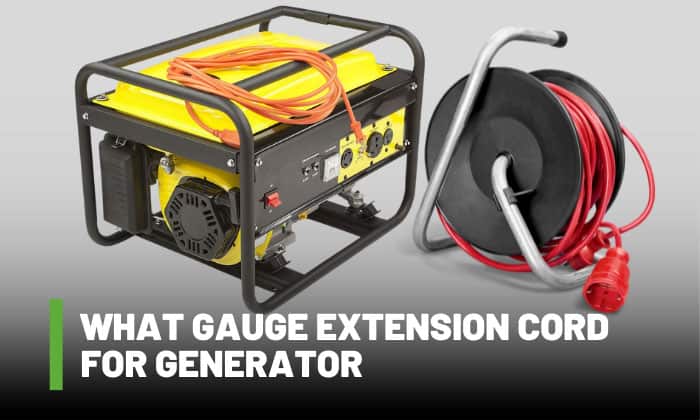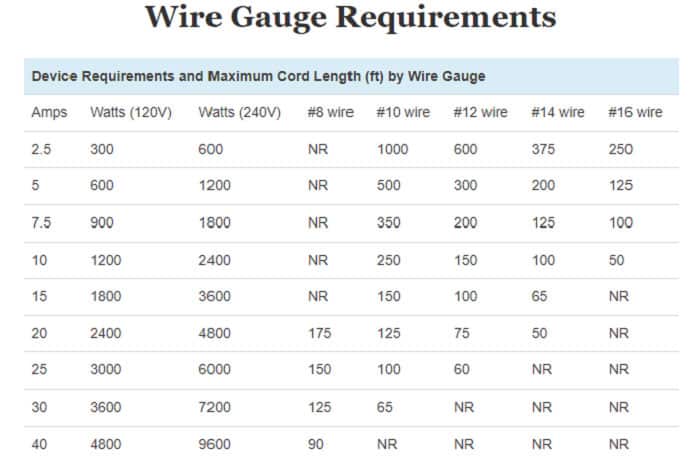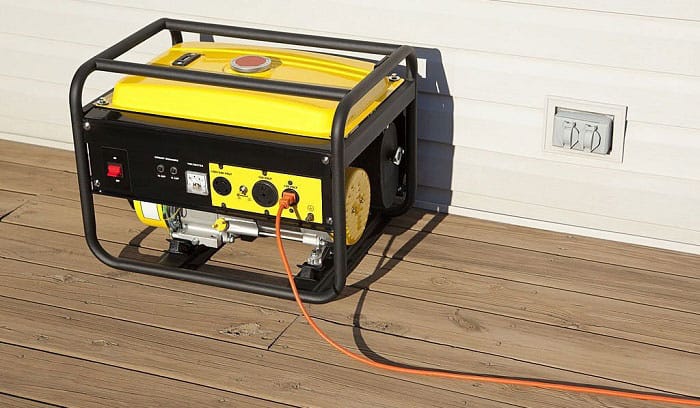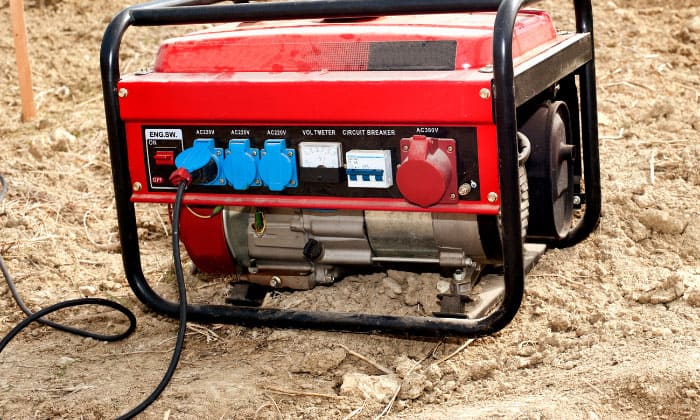We’ve used extension cords with generators since they became ubiquitous tools in our homes. However, many still face dilemmas such as, “What gauge extension cord for generator?” when planning their respective electrical setups.
If you’re looking for safe options, choose a 10 gauge or 12 gauge extension cord. These should be thick enough to handle moderate to slightly heavy loads in casual usage scenarios.
In the end, it’s always best to look at the generator’s peak power or current output (in watts or amps) and running length then use the exact cord gauge based on them.
Table of Contents
Typical Generator Sizes and Their Recommended Extension Cord Gauges
Judging by the popular portable generators at present, it’s safe to say that most don’t exceed 10,000W. I’m going to assume that you’re also not going over that limit.
- The Predator 9500 is a well-received heavy-duty generator. It peaks at 7600W and has a 220V rating.
That means it’s rated for 34A, which will do fine with a 50A cord, since that’s normally the most common option after a 30A one.
I get that there are also 40A and 45A extension cords available out there, and they will do just fine in this case if that’s what you have.
- For 4000 watt generator and a for 2200 watt generator, assuming the voltage is 120V, you’ll need 10 gauge and 12 gauge again, respectively.
- Even if you have, let’s say, a 10,000W generator rated at 240V (41A) that you’re going to use for power-hungry power tools, the most you’re going to need is a 6 gauge heavy duty extension cord for generator.
For your reference, I’ve prepared this extension cord wattage chart of actual products that specifically state they’re meant for generator use (and not necessarily just outdoor use). Most span less than 50 feet, but some extend up to 100 feet.
| Amps | Extension Cord Size | Wattage Rating |
| 15A (120V) | 14 gauge | 1825W |
| 20A (125V) | 12 gauge or 10 gauge | 2500W |
| 30A (120V/250V) | 10 gauge | 7500W |
| 50A (250V) | 8 gauge or 6 gauge | 12500W |
Here’s a table that gives you the gist of the factors and pointers I’ve shared above. The recommendations assume you’re using the generator’s peak capacity.
| Generator Size | Wire Size (>50ft) | Wire Size (<50ft up to 100ft |
| 300W @ 120V (2.5A) | 14 gauge | 14 gauge |
| 1500W @ 120V (12.5A) | 14 gauge | 12 gauge |
| 2000W @ 120V (16.6A) | 12 gauge | 10 gauge |
| 4500W @ 120V (18.75A) | 12 gauge | 10 gauge |
| 6000W @ 240V (27.2A) | 10 gauge | 8 gauge |
| 7500W @ 240V (31.25A) | 8 gauge | 6 gauge |
| 9000W @ 240V (37.25A) | 8 gauge | 6 gauge |
Obviously, these are just general calculations since generators have varying specific wattages.
As far as running lengths go, I’ve opted to limit it to just 100 feet. It’s never really recommended to go past that distance.
Keep that in mind when trying to run extension cord from generator into house. It may be better to consult an electrician who will most likely suggest a better alternative for you.
Factors to Keep in Mind to Determine the Right Gauge to Use
When using a portable generator with extension cords, I usually keep it as simple as possible by remembering these pointers:
- To keep things simple, always pair a generator with an extension cord that matches its most powerful outlet. For example, if it peaks at 30A, then use a 10 gauge cord, which is at least rated for that exact ampacity.
Although, I always recommend following the last point I’ll make in this list.
- Look at the exact wattage and voltage rating of the portable generator, or any kind of generator for that matter as well as the respective loads you’re going to connect to calculate ampacity. Most products will readily display both but rarely the amps; use the formula A = W / V.
- The power cord’s length and the extension cord should be added to account for the total running length.
For example, it’s not ideal to use a 12 gauge cord with a 1,500W generator if you intend to exceed 100 feet, which you would then connect to an equally extensive 10 gauge extension cord. It would be better to use 10 gauge for all cords to anticipate voltage drop.
- Don’t forget to include the generator’s starting/peak watts and surges when calculating.
- Most widely available generators run at 110, 115, or 120 volts and 220 or 240 volts. Lower-wattage generators are usually rated for the former, while their higher-wattage counterparts run with the latter rating.
- 30 amps is a common rating for heavy-duty generator extension cords, but you can settle for 50 amp options as well, assuming you’re running hungrier 12,000+W units.
- Go up one size once the run reaches more than 50 feet to handle voltage drop, though sometimes it’s better to use 45 feet as the limi Keep the total running length less than 100 feet.
- It’s well worth paying for the largest gauge you can get to eliminate voltage drop problems and accommodate bigger loads in the future.
Ultimately, there’s a minimal difference between determining the wire size for a generator and the extension cord you pair with it. You still need to size extension cord for generator based on the total load that the latter can handle.
For example, for refrigerator to generator, with 15A as the total ampacity, you can safely use a 14 gauge, but it would probably be best to settle for 12 gauge. This doesn’t factor in distance, obviously, but if you’re exceeding 50 feet or reach 100 feet, it’s better to go for the thicker wire.
A 10 gauge extension cord for refrigerator would be the best bet, especially if it’s connected to a breaker with the same ampacity. This is just to make sure it won’t lead to a trip.
Do’s and Don’ts of Using Extension Cords for Generators
Do:
- Match the generator’s ampacity with the correct gauge cord.
- Keep the running length of the extension cord short. As unsolicited advice, you can pair it with an air hose instead to cover the exact distance you need.
- Learn how to use the generator with the extension cord properly.
- Check both regularly for signs of wear and tear and other issues.
Don’t:
- Undersize your cord since it will lead to an overload issue.
- Abuse your cord’s heavy-duty feature by needlessly keeping them exposed to the elements for long periods of time.
- Daisy chain your cords.
Frequently Asked Questions
What size extension cord should you use with a generator?
This should always be determined by the wattage and total ampacity of the generator. Make the necessary size adjustment once the running length goes past 50 feet or reaches 100 feet and more.
For example, a generator extension cord 240v used for a 10,000W generator will need a 50A 6 gauge or 8 gauge cord since it has an ampacity of 41.6A. There’s no 45A cord, so we immediately choose the next size up.
List of best extension cords for generators
Look no further than these two options:
- Most outdoor-friendly heavy-duty extension cords, particularly those rated as S, SJ, T, H, O, OO, and W. Cords are often labeled with these letters grouped together (e.g. SJT, STOOW, etc).
- 3-prong or 4-pronged extension cords made specifically for generators
Can I use a regular extension cord on my generator?
It’s not recommended. It’s better to use extension cords meant for generators or heavy-duty varieties since they’re designed with their specific usage in mind.
Conclusion
Remember when trying to figure out what gauge extension cord for generator, look at the latter’s total ampacity, which is usually reflected by its most powerful outlet. Once you know what, you won’t have any trouble finding out the correct gauge as the recommendations don’t deviate from standard NEC wire size guidelines.
Last but not least, don’t forget to look at the generator extension cord ratings that are actually available to you either in your local stores or online. Choose only the ones compatible with generators!
Related guides to choose the best extension cord size for:

I am Edwin Jones, in charge of designing content for Galvinpower. I aspire to use my experiences in marketing to create reliable and necessary information to help our readers. It has been fun to work with Andrew and apply his incredible knowledge to our content.




